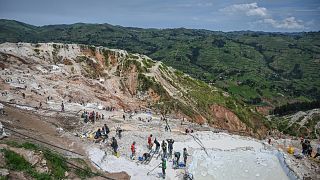Business Africa
This Week: U.S. Influence in Africa, EU-Zimbabwe Trade, and Uganda’s Tea Crisis
This week, our guest, historian Amzat Boukari-Yabara, revisits the intensifying American influence in Africa, spanning energy and mining projects. Meanwhile, the European Union seeks to strengthen its trade ties with Zimbabwe, and in Uganda, the tea industry is reeling from a pricing crisis.
Africa and the U.S.'s Multidimensional Strategy
As major powers vie for access to Africa’s strategic resources, the United States is deploying a complex strategy that blends economic investments, security cooperation, and diplomatic mediation. This approach aims not only to secure energy and mineral supplies but also to counter the growing influence of China and Russia on the continent.
Nigeria-Morocco Pipeline: An Energy and Geopolitical Keystone
The Nigeria-Morocco gas pipeline project (5,660 km, $25 billion) perfectly illustrates this strategy. Actively supported by Washington, this mega-project serves several strategic goals: reducing Europe’s dependence on Russian gas, countering Chinese advances—with the Jingye Group already supplying construction materials—and bolstering American influence. “There has been a reshaping of energy stakes since the war in Ukraine,” explains historian Amzat Boukari-Yabara, noting how the U.S. is exploiting Europe’s new vulnerabilities.
DR Congo: Mining Wealth and Instrumentalized Instability
In the Democratic Republic of Congo, U.S. strategy reveals its contradictions. On one hand, companies like KoBold Metals (backed by Bill Gates and Jeff Bezos) are making major investments in cobalt and copper extraction. On the other, Washington offers conditional military support in the east of the country while positioning itself as a mediator in the conflict with Rwanda. “We are witnessing the monetization of instability,” Boukari-Yabara warns, highlighting “a U.S. ability to exert diplomatic, commercial, and security blackmail.” This approach peaks with opaque negotiations involving Rwanda over Congolese resources, which “tend to perpetuate the crisis in eastern Congo.”
Kenya and Rare Earths: A Strategic Partnership
In Kenya, the U.S. is strengthening partnerships around rare earths, which are essential for the energy transition. This push is part of a global race for critical minerals, where Washington seeks to close the gap with Beijing. It also comes alongside a military repositioning in the region, particularly in the Sahel after France’s withdrawal.
Questionable Tactics
Recent American initiatives raise concerns about respect for African sovereignty. The most striking example is Trump’s proposal to recognize Somaliland in exchange for accepting Palestinian refugees. For Boukari-Yabara, these “deal-making negotiations” reflect a purely transactional view of relations with Africa.
In the face of this aggressive policy, the historian calls for an urgent, unified continental response: “We need to create transnational industries and resolve the CFA franc issue.” His call for unity resonates, as “all these resources directly concern the U.S. in its global vision.” The key question remains whether African countries can turn this new geopolitical rivalry into a genuine opportunity for sovereign development.
Zimbabwe: Toward Strengthened Trade Ties with the EU?
As the United States reduces its aid to many African countries, the European Union is revising its strategy on the continent—particularly in Zimbabwe. Brussels is moving from the role of donor to co-investor, offering duty- and tax-free access to its market. France is supporting local agricultural SMEs, and the Netherlands already imports Zimbabwean fruits and steel.
This renewed European trade push comes amid a tense political climate. The recent NGO law (PVO Bill), deemed repressive by civil organizations, has sparked concern. Nevertheless, the EU hopes Zimbabwean businesses will seize the opportunity.
A report by Keith Baptist.
Uganda: Tea Industry in Peril Amid Price Collapse
Uganda’s tea industry is undergoing an unprecedented crisis. Tea prices have dropped significantly, averaging just $0.79 per kilo—far below the more than $2 fetched by Kenyan and Rwandan teas. This sharp price drop has led many farmers to abandon tea in favor of more profitable crops such as maize and bananas.
Victoria Ashabahebwa, director of Swazi Tea Co. LTD, notes that more than a million Ugandans depend on tea for their livelihood. Declining tea quality, high production costs, and a lack of government support are all contributing factors. Farmers and processors have called on the government to invest in the sector and rescue an industry that was once thriving—but so far, no official response has been given.
A report by Isabel Nakirya.







![Can Uganda leverage oil to turn around economy? [Business Africa]](https://images.euronews.com/articles/stories/09/59/88/52/320x180_cmsv2_236e5c53-1dab-5e80-8bb6-ce828be63e24-9598852.jpg)






01:26
Uganda Army chief apologises to US over Bobi Wine claims
01:00
Ugandan opposition leader Kizza Besigye in critical health while jailed
00:28
South Africa declares national disaster over floods and rains that have killed 30 people
00:24
'Opposition was lucky,' Ugandan President Museveni says after securing seventh term
01:32
Ugandan police deny arrest of opposition leader Bobi Wine
02:01
Tension grips Kampala as Museveni leads and residents await election results